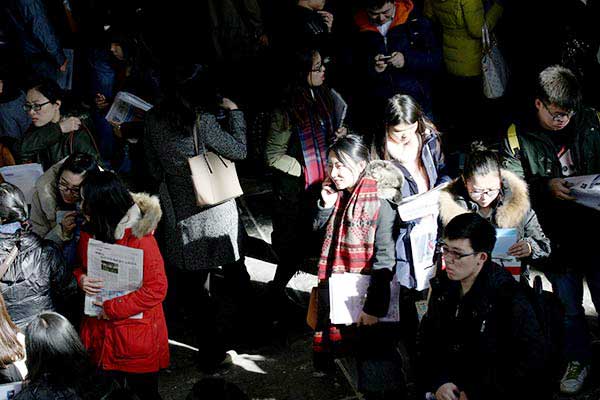
31 Dec, 2015
Big cities in China luring talent despite drawbacks
Beijing, (China Daily) 2015-12-16 -Despite heavy smog, skyrocketing house prices and living pressures, China’s first-tier cities, including Beijing, Shanghai and Guangzhou, are still the top the choices for the best brains.
At the same time, smaller cities trying to attract high-end talent are facing challenges both in recruiting and retention.
Zhaopin.com, a Chinese human resources website, released its list of Best Employers for 2015 on Friday. It showed that 70 percent of the top 100 best employers are located in first-tier cities. Among them, 40 are located in Beijing, 17 in Shanghai, 10 in Shenzhen and four in Guangzhou, Guangdong province.
|
“Earlier there were reports showing that job-hoppers favor smaller cities, as they want to escape Beijing, Shanghai and Guangzhou. This is not true,” said Guo Sheng, CEO of Zhaopin. “The majority of the best talents are not going to stay in third- or even fourth-tier cities. We saw many people leaving first-tier cities for all kinds of reasons. But most of them are not talents we are talking about.”
Guo said it is always the advanced and fast-growing industries that require the talent, and those are most often located in the bigger cities.
“Take Beijing as an example. It attracts a lot of investment, which will generate a lot of opportunities that will naturally attract many talents. Industries like the Internet, as well as culturally innovative ones, are developing very fast in Beijing, and they bring talents to stay in the city.”
However, as urbanization develops in China, the demand for high-end talent, including foreigners, in smaller cities is also growing and sometimes underestimated.
Pan Yaqun, head of the Anhui provincial Administration of Foreign Experts Affairs, said as an inland province, Anhui is less competitive in overall economic strengths compared with the country’s more developed coastal areas, while “the need for economic upgrading is probably equal”.
To attract talent, including overseas returnees and foreign experts, smaller cities are introducing preferential policies such as financial support, housing subsidies and even education solutions for the children of prospective workers.
However, Pan said some companies that succeed in finding qualified candidates for industrial upgrades are “lucky”, and many other companies haven’t found even one qualified candidate for a variety of reasons.
Zhaopin’s Guo said part of the reason is the lack of a “mechanism” to support development of high-end industries and projects, such as a mature economic structure and fundraising environment.
“Generally speaking, there are three ways to keep talent-career, salary and incentive policies. And it should start with career, instead of the opposite,” Guo said. “Many local governments started with the incentive policies, but they won’t last long.”
Related story: Interest in SOE jobs declines for third straight year, by Su Zhou, China Daily
Interest in jobs with State-owned enterprises-once regarded as the best choice for college students because such jobs offered a decent income with no risk of being laid off-has fallen for the third year in a row, a new report shows.
Zhaopin, a Chinese human resources website, conducted a poll at 20 universities in China. Only 21.7 percent of interviewees said they would go to State-owned enterprises. Last year, 22.6 percent expressed such an interest, and in 2013, 29 percent did so.
However, such jobs remain the second choice of college students, with the top choice being to work for multinationals.
“The interest in working for State-owned enterprises has seen ups and downs in the past decade, and it has tight connections with macroeconomic policies,” said Guo Sheng, CEO of Zhaopin. “In 2005, multinationals were the most popular choice. In 2009 and 2010, State-owned enterprises took the chair. And now another change has made multinationals and the private sector, especially Internet companies, the popular choices.”
The report also noted a trend that further study is becoming more prominent, with about 16.5 percent of college students saying they would not seek jobs but would continue their education instead.
“Part of the reason is the downward pressure on the economic situation. It is harder and harder to get a satisfactory job in the job market. On the other hand, it would be easier to get a good job with a better educational background,” the report said.
A record 7.49 million students graduated from China’s universities and colleges in July. The ever-rising number of graduates is rapidly becoming a challenge: Last year, the figure was 7.27 million, and in 2013 it was 6.99 million.




Liked this article? Share it!